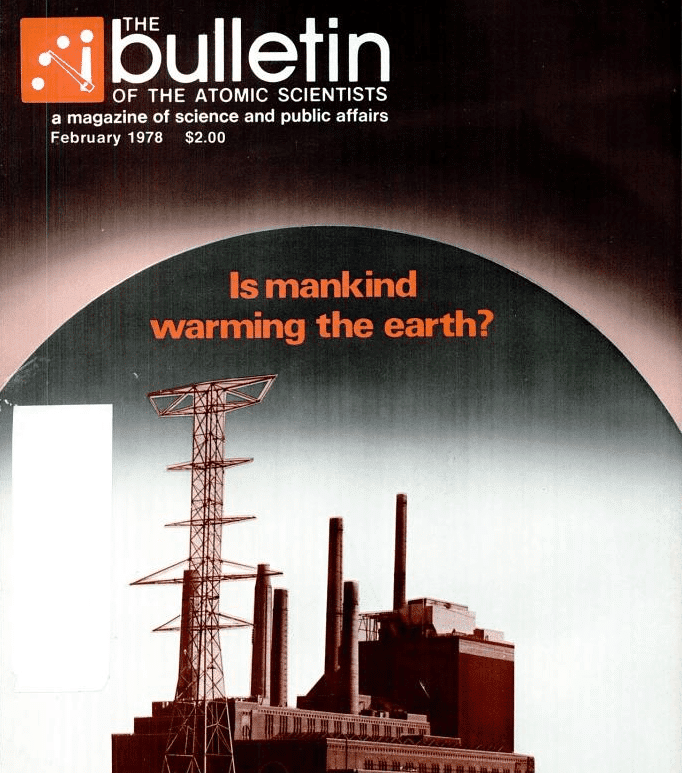The Bulletin’s authoritative climate change coverage—from 1978
By Dan Drollette Jr | April 2, 2014

With one of the toughest winters on the East Coast barely over—thousands of airline flights were canceled due to a single massive storm in mid-February, and there was a 10-inch blizzard on the outer portion of Cape Cod a week ago, belying the calendar’s claim that spring was here—it can be hard to believe that the climate is getting warmer overall. But as the most recent report of the Intergovernmental Panel on Climate Change (IPCC) points out, extremes of weather are just a few of things that happen when energy is randomly added to a complex system: Jet streams move, El Niño-type cycles become more violent, seas rise, hurricanes get more energetic, and even winter storms sometimes become more powerful.
“We are surprised and alarmed when an unusually severe winter or an unusually prolonged drought occurs, because our ‘tribal’ memories tend to be too short to recall past years when things were equally unusual. Furthermore, the dim history of periods at the dawn of civilization, when it was considerably warmer or colder for thousands of years on end, have not survived at all as a tribal memory. That longer record is still being laboriously reconstructed, ” wrote meteorologist William Kellogg, of the National Center for Atmospheric Research outside Boulder, Colorado.
But Kellogg didn’t write those words for the IPCC. He wrote them for the Bulletin of the Atomic Scientists—more than 36 years ago, in February 1978.
In his 10-page Bulletin cover story, “Is Mankind Warming the Earth?”, Kellogg wrote that the amount of carbon dioxide in the atmosphere had been increasing ever since the dawn of the Industrial Revolution, and this gas (along with other gasses produced by industry, transportation, and commercial agriculture) had the effect of creating a greenhouse. The consequent rise of the Earth’s surface temperature was causing “as large a ‘climate change’ as we are likely to encounter in the foreseeable future,” Kellogg wrote.
The quotation marks around the phrase climate change are interesting; this was probably one of the earliest uses of the term in a general interest publication. Indeed, it is instructive to remember the times in which Kellogg wrote of manmade climate change. The Bulletin cover story was published when Jimmy Carter was president, Iran was still ruled by the Shah, there was no World Wide Web, and the cost of a higher education was one-twelfth of what it is today. It wasn’t until 10 years later that NASA researcher James Hansen told Congress, with a “high degree of confidence,” that warming was the result of increased carbon dioxide in the atmosphere. Articles in science journals were describing the worries about average temperature changes of a single degree Celsius.
Now, a snapshot of the latest climate science report prepared for the World Bank by the Potsdam Institute for Climate Impact Research says that we are on a path to a world that may be more than 4 degrees Celsius (about 7.2 degree Fahrenheit) warmer by the end of the 21st century, along with sea levels that are two feet higher than they are today.
At this stage in the game, the goal is just to limit the damage to 2 degrees Celsius of temperature increase.
In hindsight, Kellogg was wrong about some details, such as an expected straight-line increase in observed global temperatures. In reality, the increase has been more varied. But he was right in his prediction about the amplified effects of climate change in the polar regions, where things have been warming up about 3.6 times faster than the average global surface warming.
And the takeaway comment in this Bulletin article has not changed: “What is clear is that no one nation or small group of nations can take the necessary action to change the course of events. The cause (burning of fossil fuels) is a worldwide phenomenon, and the effect (a warming) is global in extent… The observation bears repeating: Never in the history of mankind have we been faced with an environmental problem whose solution requires so many important decisions at the international level.”
Subscribe to the Bulletin’s premium magazine to access over 75 years of authoritative reporting on existential threats.
Together, we make the world safer.
The Bulletin elevates expert voices above the noise. But as an independent nonprofit organization, our operations depend on the support of readers like you. Help us continue to deliver quality journalism that holds leaders accountable. Your support of our work at any level is important. In return, we promise our coverage will be understandable, influential, vigilant, solution-oriented, and fair-minded. Together we can make a difference.
Topics: Analysis, Climate Change














